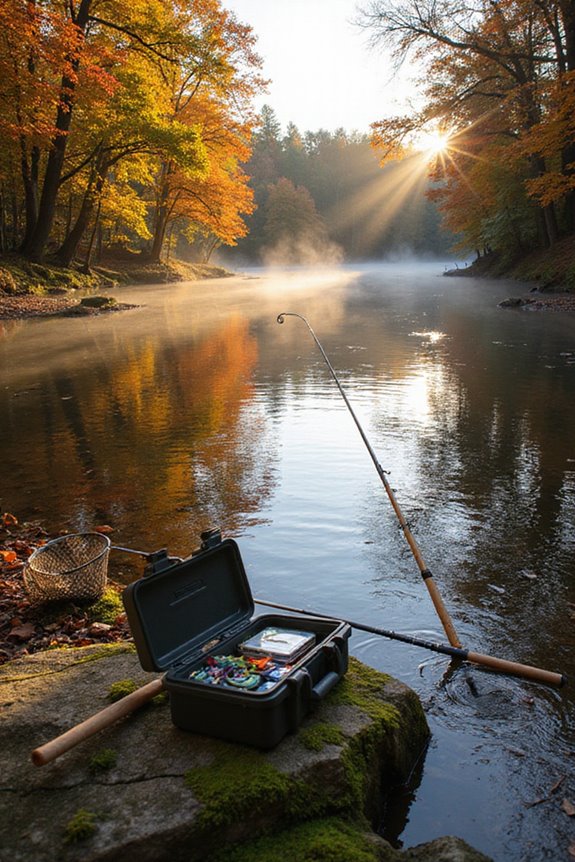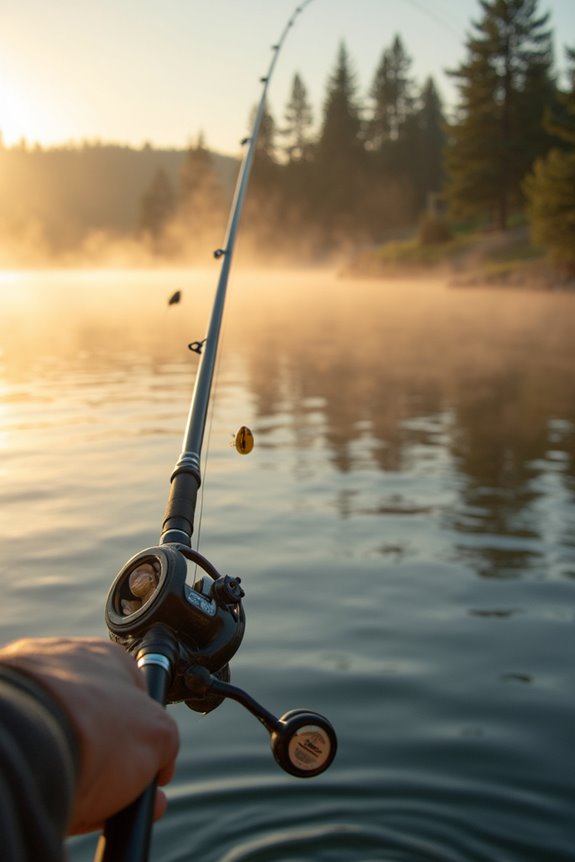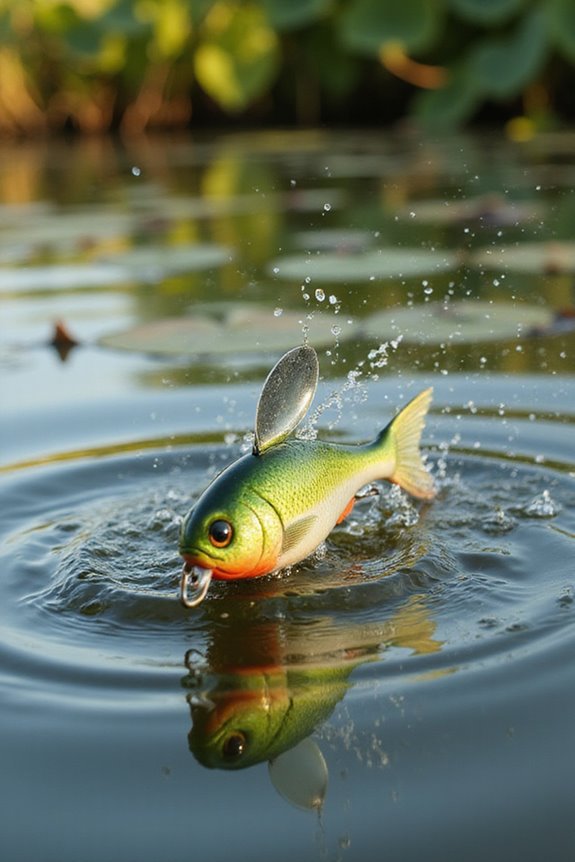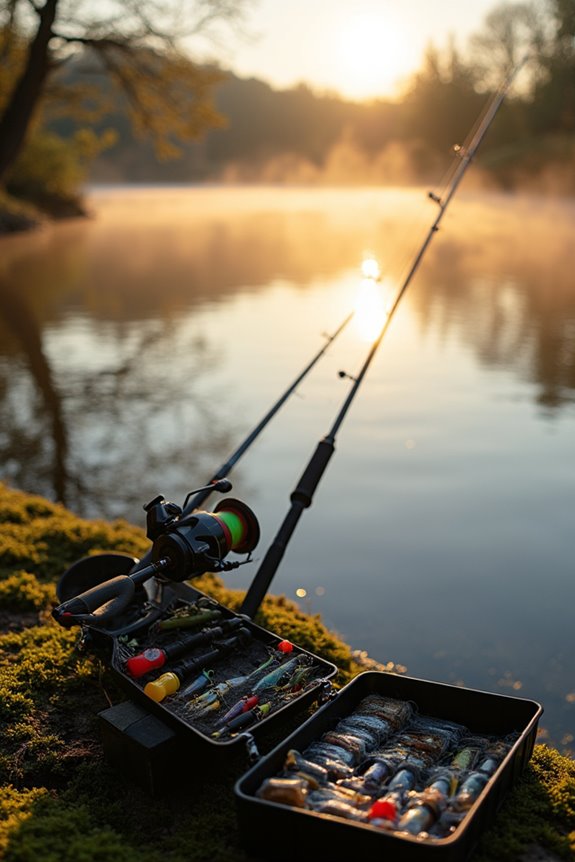In Pennsylvania, a resident fishing license costs $27.97, while non-residents pay $60.97. If you’re over 65, it’s just $14.47, and disabled veterans can get a reduced fee license. For trout fishing, an additional permit is required, especially from March 15 to April 30. There are short-term options for tourists, too. Remember, a $1.00 issuing fee and a $0.97 transaction charge apply to each license. There’s much more to know about permits and regulations as you get started.
Key Takeaways
- Annual resident fishing license costs $27.97, while the non-resident license is priced at $60.97.
- Seniors aged 65 and older pay a reduced fee of $14.47 for resident licenses.
- Short-term licenses for tourists are available at 1-day and 3-day rates.
- Disabled veterans can obtain a reduced-fee fishing license with proof of veteran status.
- Each license incurs a $1.00 issuing agent fee and a $0.97 transaction charge.
Overview of Fishing License Types in Pennsylvania
When you’re considering fishing in Pennsylvania, it’s essential to understand the various types of licenses available, as each serves a specific purpose. The general fishing license, issued by the Pennsylvania Fish & Boat Commission, is required to fish in all waterways, and it’s valid from December 1 to December 31 of the following year. For those interested in specific fish, like trout, a separate trout permit is necessary, especially during fishing season restrictions from March 15 to April 30. For tourists, short-term licenses like the 1-day or 3-day options offer flexibility without long-term commitment. Disabled veterans and youth also have access to reduced-fee licenses, ensuring everyone can enjoy fishing while adhering to the fishing license regulations in Pennsylvania. Many anglers pair their license with high-quality bass fishing combos that feature medium to medium-heavy power ratings ideal for Pennsylvania’s freshwater species.
Resident vs. Non-Resident Fishing Licenses
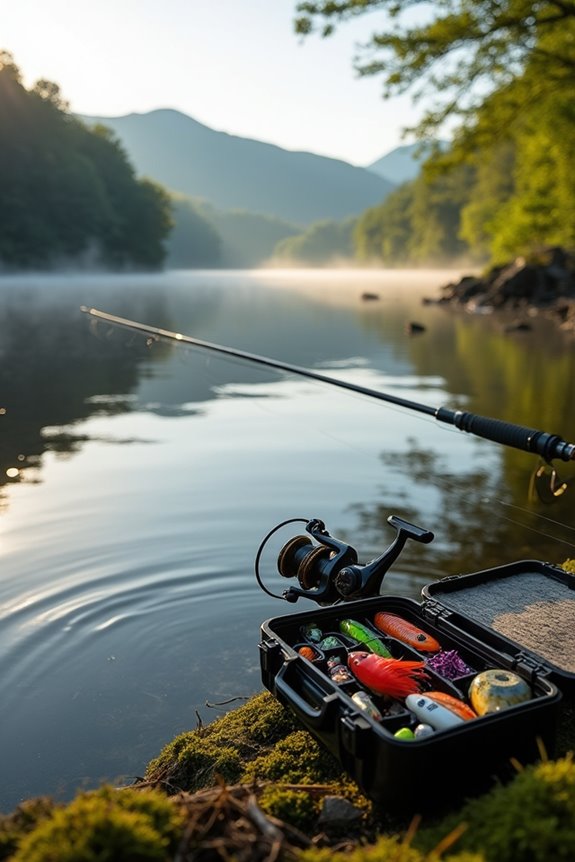
Understanding the differences between resident and non-resident fishing licenses in Pennsylvania can help you choose the right one for your needs. Resident advantages are clear, as a standard annual fishing license costs just $27.97, while non-residents pay $60.97. For seniors aged 65 and older, residents enjoy a reduced fee of $14.47, a benefit not available to non-residents. Additionally, residents can purchase licenses for longer durations, such as 5-year or lifetime options, which aren’t available for non-residents. Non-resident challenges include higher costs and limited license types, such as short-term 1-day, 3-day, and 7-day options. Once you have your license, consider investing in Plano tackle boxes with their adjustable compartments and water-resistant features to keep your gear organized and protected during your fishing trips. If you’re planning a fishing trip, knowing these differences can save you money and time while ensuring you comply with regulations.
Special Category Licenses and Their Costs
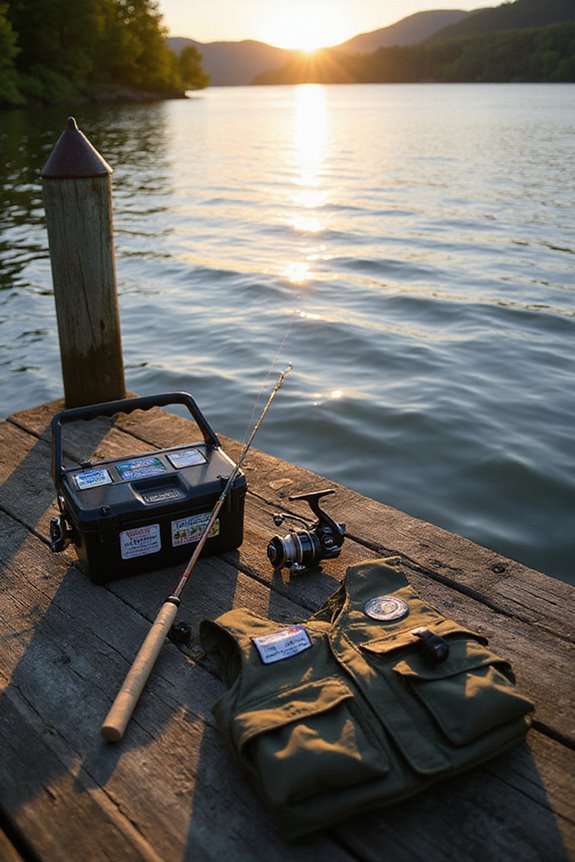
Special category licenses in Pennsylvania offer unique opportunities for specific groups of anglers, making fishing more accessible and affordable. For disabled veterans, the Disabled Veterans Reduced Resident License provides a standard fishing license at a reduced fee, requiring proof of veteran status. This license grants access to all regulated Pennsylvania waterways, supporting those who have served. Additionally, former prisoners of war can obtain a POW Resident Annual License, which may also come at a reduced cost. Senior residents aged 65 and older can purchase a Senior Lifetime Fishing License for a one-time fee of $86.97. During emergencies or severe weather, anglers should consider carrying emergency radios for receiving critical NOAA weather alerts while fishing. Finally, special needs licenses and low-cost permits for youth encourage participation, ensuring fishing remains an enjoyable experience for everyone in Pennsylvania.
Additional Permits and Stamps for Fishing
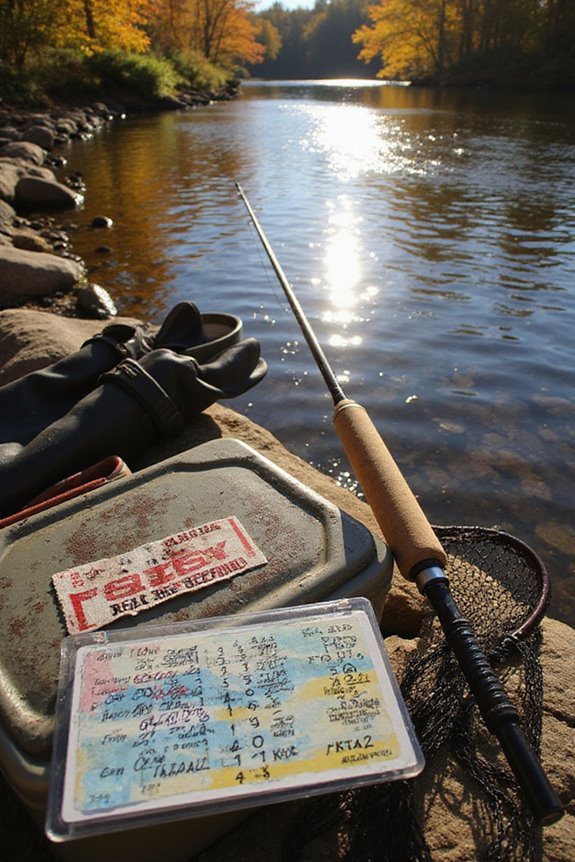
What extra permits do you need to fish in Pennsylvania? If you’re targeting trout, you’ll need trout permits in addition to your fishing license if you’re 16 or older. These permits are essential when fishing in waters with special trout regulations, like Class A Wild Trout Waters and during the trout stocking season from March 1 to May 31. If you’re planning to fish in Lake Erie, a combination permit is necessary to keep salmon or trout caught in those waters. You can obtain both trout permits and Lake Erie combination permits at authorized points of sale or online. Remember to carry your permits and license while fishing, as enforcement officers may request to see them.
License Purchase Fees and Associated Charges
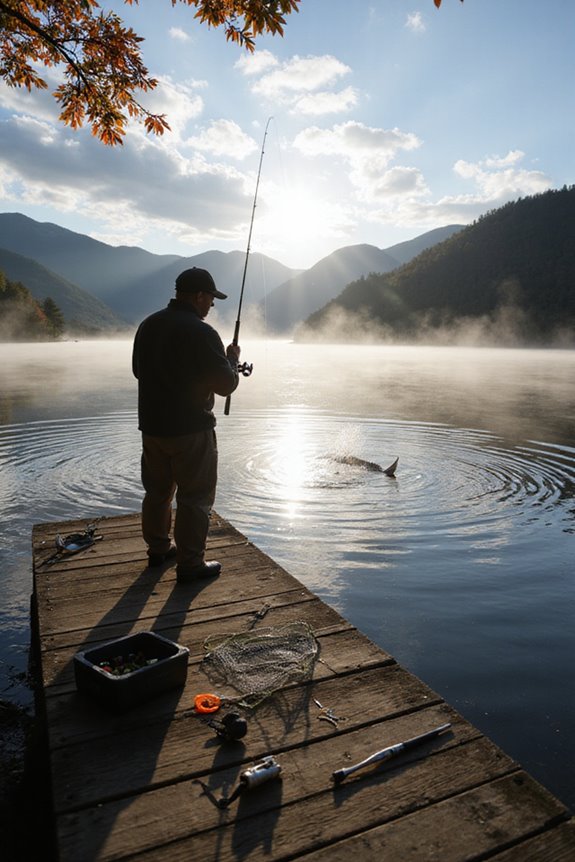
When planning your fishing trip in Pennsylvania, knowing the license purchase fees and associated charges is important. The annual resident fishing license costs $27.97 for individuals aged 16 to 64, while seniors aged 65 and older pay $14.47. Non-resident licenses have higher fees, which you can check online. One-day licenses vary in cost and have specific validity periods. Be aware that each license purchase incurs a $1.00 issuing agent fee and a $0.97 transaction charge. These fees apply to both online and in-person purchases. If you’re eligible for certain no-cost licenses, like those for veterans, you won’t face these additional charges. Understanding these license fees and transaction charges helps you budget for your fishing adventures effectively.
Age Requirements for Fishing Licenses
In Pennsylvania, anyone aged 16 and older must have a valid fishing license to fish legally in state waters. If you’re under 16, you can enjoy youth fishing without needing a license, which is great for introducing kids to the sport. For those 65 and older, Pennsylvania offers senior discounts on fishing licenses, making it more affordable to fish. You can choose between an Annual Senior Resident Fishing License for about $14.47 or a Lifetime Senior Resident Fishing License for around $86.97. Both options provide easy access to fishing without worrying about yearly renewals. Just remember, if you’re 16 or older, keep your license handy for inspection at any fishing location to guarantee compliance with regulations.
Cost Variations by County
While fishing in Pennsylvania generally offers consistent license costs across counties, it’s important to understand that specific permit types may vary based on local resources. For example, counties like Erie, with its abundant fishing hotspots, often promote Lake Erie permits. However, these permits cost the same statewide, at $9.97. County fishing regulations are uniform, so you won’t find different license prices even if local demand varies. That said, some counties may offer additional services, like assistance with special permits for veterans. Overall, whether you’re in Lawrence or Adams County, the price remains steady, ensuring that you can focus on what matters most—landing that catch.
Special Purpose Permits Explained
Special purpose permits play an essential role in Pennsylvania’s fishing landscape, offering anglers specific access to diverse waters and species. For trout fishing, a Trout Permit is necessary, costing $14.97 and printed on your license. If you’re targeting the waters of Lake Erie or its tributaries, you’ll need a Lake Erie Permit for $9.97, or you can get a Combination Trout Lake Erie Permit for $20.97. For those using nets, cast net, throw net, and dip net permits are available, primarily for methods in the Lake Erie watershed. These net permits allow for regulated fishing practices, ensuring the conservation of fish populations. Remember to carry your permit for inspection during your fishing activities to avoid penalties.
How to Purchase a Fishing License
Purchasing a fishing license in Pennsylvania is straightforward and can be done through several convenient methods. You can buy your license online via the Pennsylvania Fish & Boat Commission website, which allows immediate validity upon payment. Simply visit the site, fill out the required information—including your Social Security number—and select your desired license. For those who prefer a phone purchase, you can call the Pennsylvania fishing license line at 877-707-4085. Additionally, licenses are available at over 1,300 authorized vendors, including hardware stores and Walmart. If needed, county treasurer offices also offer certain licenses. Remember to have proof of residency or age, as this might be required for specific licenses. Happy fishing!
Validity and Usage of Fishing Licenses
Understanding the validity and usage of fishing licenses in Pennsylvania is vital for every angler. Your annual fishing license is valid from January 1 to December 31, with some licenses starting as early as December 1 of the prior year. If you’re over 65, you can obtain a lifetime license that never expires. Remember, licenses must be signed and displayed on your outer garment while fishing. Also, be aware of license expiration dates and make sure you renew your license annually unless you’ve opted for a multi-year or lifetime license. Compliance with fishing regulations is essential, as you’ll need to show your license and identification upon request by enforcement officials. Enjoy your time on the water responsibly!
Frequently Asked Questions
Can I Fish Without a License in Pennsylvania?
I can’t fish without a license in Pennsylvania unless I qualify for specific license exemptions, like fishing on designated “Fish For Free Days” or mentoring a youth. Always check fishing regulations to stay compliant!
What Happens if I Fish With an Expired License?
Fishing with an expired license is risky; it’s like tempting fate. License penalties can hit hard, and fishing regulations are strict. I wouldn’t want to face fines or worse for a careless mistake.
Are Fishing Licenses Refundable if Unused?
I’ve learned that under the license refund policy, unused license guidelines in Pennsylvania don’t allow refunds. If you purchase a fishing license, make sure you’re ready to use it, as refunds aren’t available.
Can I Transfer My Fishing License to Someone Else?
Transferring my fishing license feels like trying to move a mountain! But I learned that fishing license transfers are regulated by strict license ownership rules, so always check with the Pennsylvania Fish and Boat Commission first.
Do Fishing Licenses Cover All Types of Fishing Gear?
Fishing licenses generally cover most gear regulations, like rods and reels, without extra permits. However, there are license exceptions for specific situations, like trout fishing or using more than three lines. Always check local rules!

